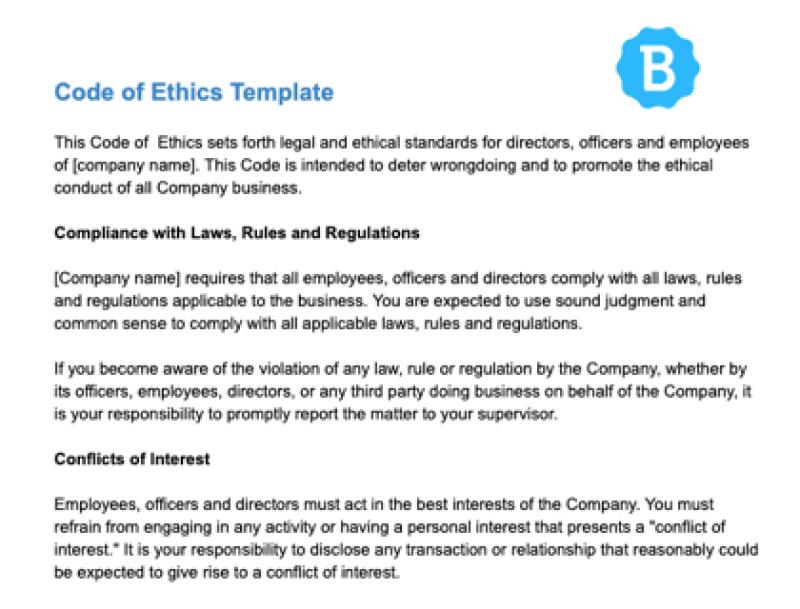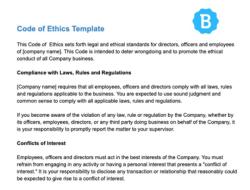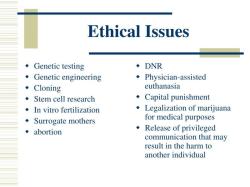How do I conduct ethical training?
Conducting ethical training is essential to promote a culture of integrity, compliance, and ethical decision-making within an organization. Here are several methods and best practices for conducting ethical training:
Identify Training Objectives:
- Clearly define the objectives of the ethical training. Determine the specific ethical principles, policies, or regulations that need to be covered. Tailor the training to address the unique ethical challenges and considerations relevant to your organization.
Understand the Audience:
- Consider the needs and characteristics of your audience. Understand their roles, responsibilities, and the ethical dilemmas they may encounter. Customizing the training content to the audience's level of understanding and job functions enhances its relevance.
Interactive Workshops and Case Studies:
- Use interactive workshops and case studies to engage participants actively. Real-life scenarios allow participants to apply ethical principles to practical situations, fostering a deeper understanding of ethical decision-making.
Role-Playing Exercises:
- Conduct role-playing exercises to simulate ethical dilemmas that employees might face. This experiential learning approach allows participants to practice making ethical decisions in a safe environment and enhances their problem-solving skills.
Discussion Forums and Group Activities:
- Create opportunities for open discussions and group activities. Encourage participants to share their perspectives, experiences, and insights on ethical issues. This collaborative approach fosters a sense of shared responsibility for ethical behavior.
Ethical Leadership Training:
- Provide training for leaders and managers on ethical leadership. Leaders set the tone for the organization's ethical culture, and training should emphasize the importance of leading by example and creating an ethical work environment.
Online Training Modules:
- Develop online training modules for flexibility and accessibility. Online courses allow employees to complete training at their own pace, and they can be a useful tool for organizations with geographically dispersed teams.
Guest Speakers and Subject Matter Experts:
- Invite guest speakers or subject matter experts to share their insights and experiences. External perspectives can bring fresh ideas and enhance the credibility of the training. This could include ethics professionals, industry experts, or representatives from relevant regulatory bodies.
Ethics Training Manuals and Resources:
- Provide participants with comprehensive ethics training manuals and resources. These materials serve as reference guides and reinforce key concepts covered during the training sessions.
Assessment and Evaluation:
- Incorporate assessments and evaluations to measure the effectiveness of the training. This could include quizzes, surveys, or practical assessments. Use feedback to make improvements and adjustments to future training sessions.
Continuous Learning Opportunities:
- Establish a framework for continuous learning on ethics. Offer ongoing resources, updates, and refreshers to keep ethical considerations top of mind for employees.
Incorporate Organizational Values:
- Ensure that the training aligns with the organization's values and ethical standards. Emphasize the importance of upholding these values in all aspects of work.
Remember to tailor the training program to the specific needs and culture of your organization. A well-designed and engaging ethical training program contributes to a workplace environment where employees are better equipped to make ethical decisions in their daily roles.
What are the essential components of effective ethical training programs?
Effective ethical training programs go beyond simply listing rules and regulations. They equip individuals with the knowledge, skills, and motivation to make ethical decisions in diverse situations. Here are some essential components of such programs:
Content and Structure:
- Foundational knowledge: Programs should provide a clear understanding of core ethical principles, like justice, fairness, autonomy, beneficence, and non-maleficence. This helps participants recognize ethical dilemmas and their potential consequences.
- Scenario-based learning: Real-world case studies and simulations bring ethical concepts to life and challenge participants to apply their knowledge in practical situations.
- Decision-making frameworks: Teach participants ethical decision-making models and tools, such as ethical risk assessment frameworks, to structure their reasoning and choose the most ethical course of action.
- Diversity and inclusion: Consider ethical issues through various lenses, recognizing the impact of cultural differences, biases, and power dynamics. This fosters inclusivity and respect for diverse perspectives.
Engagement and Participation:
- Interactive activities: Discussions, role-playing exercises, group projects, and debates encourage active participation and critical thinking about ethical challenges.
- Facilitation and coaching: Skilled facilitators can guide discussions, challenge assumptions, and provide constructive feedback to help participants deepen their understanding and develop their ethical decision-making skills.
- Peer-to-peer learning: Sharing personal experiences and perspectives in a safe and supportive environment can create a sense of community and strengthen collective understanding of ethical values.
Application and Reinforcement:
- Connecting to specific roles and practices: Tailor the training to the specific ethical challenges faced by participants in their professional or personal lives. This enhances the relevance and real-world applicability of the training.
- Ongoing follow-up and support: Provide resources and support mechanisms for participants to address ethical concerns and dilemmas they encounter after the training. This reinforces learning and enables consistent ethical decision-making.
- Evaluation and improvement: Regularly assess the effectiveness of the training program through feedback and data analysis. This allows for ongoing improvement and ensures the program remains relevant and impactful.
Overall, effective ethical training programs provide participants with the knowledge, skills, and confidence to act ethically in a variety of situations. By incorporating these essential components, such programs can play a crucial role in fostering a culture of integrity and ethical conduct within organizations and communities.
I hope this information is helpful! Feel free to ask if you have any further questions about specific aspects of effective ethical training programs.



